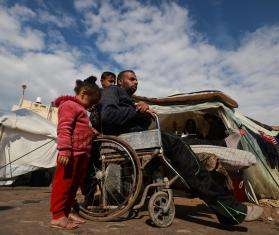Major Killer of Children is a Preventable Disease
Malaria Facts:
- 1 out of every 20 African children dies of malaria.
- The most common age of death is 4.
- Malaria is a threat to 40% of the world's population.
- Some strains of malaria are resistant to all 8 available drugs.
- The ratio of American research funding for malaria versus cancer is 1 to 54.
In the United States, an encounter with summer's most annoying pest—the mosquito—is trouble enough. But in large parts of the world, it can be deadly. Malaria infects 300 to 500 million people every year, and kills nearly 3 million, including 1 million children. A single mosquito bite can spread the disease, which causes fever, chills, nausea, and in some cases death. This disease, which was eradicated in the United States during the 1950s, is one of the world's biggest killers of children.
The greatest problem impeding the struggle against malaria is the rise of resistance to the drugs that treat the disease. In many parts of the world, the most common drugs used to treat malaria no longer work, and doctors are resorting to more expensive alternatives. In some countries even these are seeing resistance. As a result, countries that had seen a decline in malaria cases are now seeing a resurgence.
In the United States, where there are ample resources and expertise to help develop new drugs or a vaccine for malaria, most pharmaceutical companies have actually eliminated research programs for malaria and other diseases that occur mostly in the developing world. It is simply not profitable. Currently, no major pharmaceutical company is conducting research and development for a new malaria drug, so it is unlikely that there will be new drugs to combat resistant malaria within the next 5 to 10 years.
Few Americans are aware of the terrible toll of malaria. But American Doctors Without Borders/Médecins Sans Frontières (MSF) volunteers are working in the parts of the world most affected by disease. Our volunteers-both in the field and at home-are available for interviews.
Interview an MSF Volunteer in the Field:
Brazil - Kathy Mahoney of Wellesley, Mass., and Molly Savitz of Santa Cruz, Calif., are working in the Javari River Valley of Brazil, near the borders of Peru and Colombia. Kathy and Molly, both nurses, navigate treacherous waterways, mountains, and jungles to reach villagers in need of health care. The indigenous population of this region has seen a huge population drop-largely due to malaria-since the 1970s, when non-native oil miners arrived, along with their diseases. To combat malaria, MSF has contributed microscopes to villages throughout the region and trained community health workers on how to use them to diagnose the disease. Kathy and Molly regularly visit the community health workers to monitor their progress.
Thailand - Teela Swanson of Normal, Ill., an emergency room nurse, has been working in refugee camps along the Thai/Burmese Border since November, 1997. For 13 years, MSF has worked in these camps with ethnic Karen refugees, whose primary public health problem is malaria. In Thailand, the disease is resistant to most available drugs, including Mefloquine, which in other parts of the world is the most effective. As a result, refugees must always sleep under insecticide-impregnated mosquito nets to avoid being bitten.
Myanmar (Burma) - Last November, Peter Cardiello of Boston, Mass., left his job as a pediatrician to become MSF Malaria Project Coordinator in Myanmar (Burma). Dr. Cardiello's team travels long distances by boat and on foot to reach distant villages ravaged by malaria. Often he treats 200 to 300 patients per day, about half of whom have malaria. On one occasion, he set foot on a trail, unsure of how to reach the village of Kamanselk, entirely dependent on instructions from villagers in successive communities, until he reached his destination! Peter is currently conducting a study of the effectiveness insecticide-impregnated "bed-nets" for preventing infection from mosquitoes during the night.



